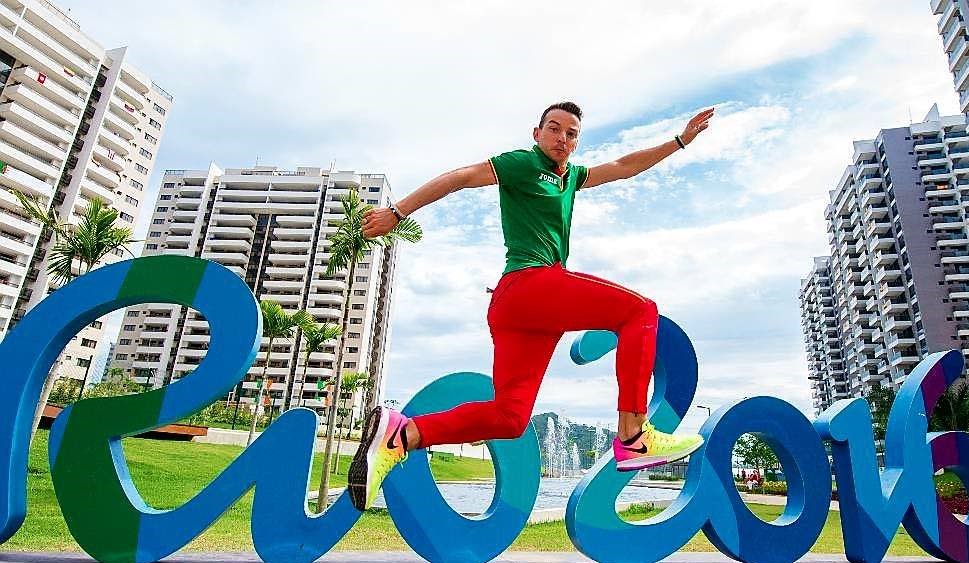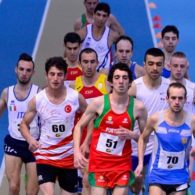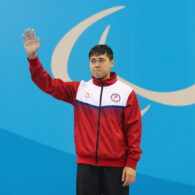Lenine Cunha on reaching 200 career medals, his mother and life as an athlete
Portugal’s Lenine Cunha is a familiar face on the Virtus: World Intellectual Impairment Sport and Paralympic stage.
This week, the London 2012 bronze medallist will go for his 200th career medal at the 2019 World Intellectual Impairment Sport Indoor Athletics Championships (Europe) organised by Virtus: World Intellectual Impairment Sport Europe in Istanbul, Turkey.
Find out more about the Portuguese track and field athlete – one of the most prolific athletes with an intellectual impairment in the world.
Gaurav Mokhasi (GM) for Virtus: World Intellectual Impairment Sport: You have competed in triple jump, decathlon, hurdles, 200m, high jump, pentathlon, heptathlon, long jump, pole vault. Are you unique amongst athletes in playing and being good at so many sports? Which sport is your favorite?
Lenine Cunha (LC): Everyone is unique in their own way! We are all different from each other and that’s what makes the world such a beautiful and diverse place. I have my way of training, I have my own life experiences, I have my own personality and that makes me who I am, yes unique, like everyone else! I love sport and athletics in general but I must confess that long jump and triple jump are definitely my favorite.
GM: When did you discover you were good at sports? When did you decide to do this full-time and make it your career?
LC: As it is known already, I suffered from meningitis at the age of four and, aiming to help in my recovery and mental development, my beloved mother signed me up in sports. I enjoyed it more and more as time went by and it made so much sense that it didn’t take long for us to realise that it was the best decision my mother could’ve made. I was becoming stronger, fitter, more disciplined every day and before I even realised it, I had already found the great passion of my life. So that said, I truly believe that I didn’t choose Sports. Life made that choice for me.
GM: Could you tell us a bit about your experience with meningitis and intellectual impairment? How has that struggle shaped your outlook on sports and life? How important was your mother’s support during your formative years?
LC: Well, it obviously must have been a shocking experience to my family, however, and I say this all the time, it was at the same time a terrible event and a happy coincidence because if it were not because of meningitis I wouldn’t be the athlete I am today. The remnants left from meningitis were the main reason my mother signed me up in sports, I lost the ability of walking, talking, listening and my cognitive development was far behind other kids my age. So it was definitely a struggle to keep up in school, human relations and consequently my shyness regarding other kids, you know bullying is real and I just didn’t fit in the “normal” world. My mother in her infinite love obviously realised that and she didn’t want me to suffer but at the same time she refused to quit on me. So she made the decision that changed my life completely. You know, sports helped me a lot in every possible way, the help I got from my colleagues, my motor coordination, emotions, pretty much everything improved with sports. I will always be thankful to my mother for that.
Can you tell us a bit about your social work raising awareness of meningitis and intellectual impairments?
I am often invited to be in talks to share my life experience so that said, every time I have the chance to speak about the importance of vaccination regarding meningitis I will always try to give hope because there is and I am the real example of it!
What was your experience competing at the World Intellectual Impairment Sport European Games in Paris last year like? You won two silver and three bronze medals.
After being absent for a long time because of my knee surgery it was amazing to go back to competitions. It was obviously even better to win five medals knowing that I was not feeling 100 per cent yet so yes, it felt great!
You have stated that you are going after your 200th career medal. How do you keep yourself motivated after such a long career and so many medals?
Being passionate about something is the greatest motivation. This is just a goal that I placed in my mind and that said, being stubborn helps a lot! Before I could even realize, I already had 134 medals! After that, I placed a goal in my mind, to reach 200 medals. I am extremely happy to be so close, I have no reason to not be very motivated!
How do you keep yourself fit and going at the age of 35? What is your training regimen and diet like? Has it evolved over the years or more or less remained the same?
I am actually very cautious with my wellbeing in general. I try to eat clean and on time to make sure everything goes well. I am well aware of my age and I know that my body does not respond as if I was 20. That said, I know that I have to take a great care of my body and mind and it’s actually working because I’m still in the run for the podium.
Once you achieve 200 medals, what will your next target be?
I will focus on the other part of my goal. To assemble a valuable team that can help me create my own sports team so I can give back to others like me in order to provide them the right opportunities.
What has been your career’s biggest and most memorable achievement?
Without a doubt, winning the bronze medal at the London Paralympic Games in 2012 was the most memorable achievement of my career. I had lost my mother only a few weeks before that and I didn’t know if I was going to be able to make it to the Games. But somehow I did and I felt my mother with me at that time. That will always be the biggest moment of my career.
You got a bronze model at the London Paralympic Games in 2012, after not competing at the Paralympics for 12 years. How did you feel standing on the podium?
As I answered in the previous question, it was a very special moment for me. After 12 years without competing, going through a very hard time because of my mother’s passing and still reaching the podium for my country was…indescribable.
What is the role that your coach Jose Costa Pereira have played in your success?
About my coach Jose, we are together for 20 years already and there is no other way to say this: If it wasn’t for him, I would not be the athlete and the man I am today. My success is our success, it only happened because of him.
Portugal has a great sporting culture. What has the support for Portuguese people and government been like for you?
Portuguese people have been supporting me for a long time now and I feel very grateful for that. The government is showing significant changes regarding the support for Paralympic athletes. They are now, gradually, equating the monetary support between Olympic athletes and Paralympic athletes so, it’s finally getting better for all of us.
You suffered an injury and had to undergo surgery in 2017. What was your experience of coming back from that like? Do you have any advice for athletes recovering from injury?
My best advice is: Be patient! I got frustrated so many times because I wanted to go back to training so bad and I just couldn’t. That didn’t help at all. So, needless to say, as soon as I could go back to training, I was a happy man!
What do you like to do when not playing sports? What do you do to relax?
Music! Listening to music is my other passion! I absolutely love to relax while listening to music. Browse on the internet is something that I also enjoy very much.
Can you tell us about the sports academy that you have started?
It is still at a very embryonic stage, however, I believe that I’ve already found the right team to join and help me making this dream come true, especially my manager, Judite Freitas, that besides being a great friend, is also the ice prPesident of the Sport Club Lenine Cunha. It is a project that is open to everyone, without exception and which aims to mostly provide the right opportunities for those who are determined to pursue athletics. Basically, I want to become a coach and pass my experience in order to help people thrive in athletics. However, if someone does not want to pursue a professional career in athletics, it doesn’t mean that they can’t join us in the club, as I said before, it is open to everyone who is open to adopt a healthy lifestyle and that have good values to share, since I believe that we can learn from each other. I feel like it will be a place where everyone should feel included in order to become better and better every day, in every way.
What is your goal at the Global Games in Brisbane? Do you plan to compete in another Paralympics (Tokyo 2020)?
To give the best of me and to be as well classified as I can and yes, I plan to compete in Tokyo 2020 knowing that will probably be my last time competing in an event like this.
What do you think your legacy will be? What would you like to be remembered for?
I want to be remembered for never giving up! I want people to look at me and see hope. And I want people to know that, even when everything looks dark, you can still thrive and be the best in the world if you believe!
The 2019 World Intellectual Impairment Sport Athletics Indoor Championships (Europe) run from 8-10 March. You can also catch Cunha in action at the 2019 Global Games from 12-19 October – the world’s biggest high performance sport event for athletes with intellectual impairments.




